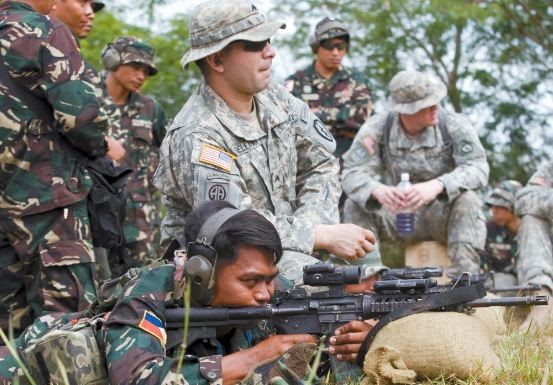The United States will accelerate a 2016 plan to strengthen the land and naval forces of its allies in Asia facing-off against China despite the defection of the Philippines and its pro-communist president (Rodrigo Duterte) to China's side.
American media said the Pentagon is vigorously forging ahead with its support to allies in the Pacific as they continue standing against a China, which remains undeterred by legal and world opinion condemning its claim to own most of the South China Sea.
The core for the effort supporting the navies of America's allies is the Southeast Asia Maritime Security Initiative (MSI) whose goal is "to drive cooperation on maritime security challenges and aggression in the South China Sea." The initiative introduced in 2015 was implemented in April 2016.
Its members are the five member states of the Association of Southeast Asian Nations (Indonesia, Malaysia, the Philippines, Thailand and Vietnam) plus Singapore, Brunei and Taiwan.
More important, the initiative provides new funding to authorize a U.S. Department of Defense effort to train, equip, and provide other support to the Philippines, Vietnam, Indonesia, Malaysia, and Thailand.
Secretary of Defense Ash Carter committed $425M over Fiscal Years 2016-2020 for MSI with an initial investment of $50M available in fiscal year 2016 toward this effort.
There is also a substantial U.S. Army component to the MSI. Army participation involves more and more military-to-military activities with allies in the region; coordinating with other leaders and land armies and efforts to move or re-position weapon systems in the area.
The ground element of the Pacific rebalance is important to ensure the stability in the region. The re-balance to the Pacific is both a military and economic initiative.
Also, the Pentagon appointed a four-star general as Commander of U.S. Army Pacific (USARPAC), the United States Army's largest Service Component command. The current USARPAC commander is General Robert B. Brown.
The command is headquartered at Fort Shafter, Hawaii with portions of the command-forward deployed and based throughout the Indo-Asia Pacific.
The Army has some 18,500 men stationed in Korea; 2,400 in Japan; 2,000 in Guam; 480 in the Philippines; 22,300 in Hawaii and 13,500 in Alaska.



























